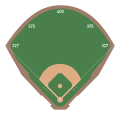Herschel Greer Stadium
demolished Minor League Baseball park in Nashville, Tennessee, USA
Herschel Greer Stadium was a baseball park in Nashville, Tennessee.[6] It was the home stadium of the Nashville Sounds, who are a Minor League Baseball team. It opened on April 26, 1978.[6] The Sounds played there for 37 years. Their last game was on August 27, 2014.[6] In 2015, the Sounds began to play at a new stadium called First Horizon Park.[6] Greer Stadium was demolished to become part of a park in 2019.[7]
 A view of the stadium from the right field seats | |
 | |
| Full name | Herschel Greer Stadium |
|---|---|
| Location | 534 Chestnut Street Nashville, Tennessee United States |
| Coordinates | 36°8′36″N 86°46′25″W / 36.14333°N 86.77361°W |
| Owner | Nashville Metro Government |
| Capacity | 10,300 (fixed seating)[3] 15,000 (plus standing room) |
| Record attendance | 22,315 (August 18, 1982; Nashville Sounds vs. Columbus Astros)[4] |
| Field size | Left field: 327 ft (100 m) Left-center field: 375 ft (114 m) Center field: 400 ft (120 m) Right-center field: 375 ft (114 m) Right field: 327 ft (100 m)[5] |
| Surface | Grass |
| Construction | |
| Started | August 26, 1977[1] |
| Opened | April 26, 1978 |
| Closed | August 27, 2014 |
| Demolished | 2019 |
| Construction cost | $1.5 million ($6.23 million in 2021 dollars[2]) |
| Tenants | |
| Nashville Sounds (SL/AA/PCL) 1978–2014 Belmont Bruins (NAIA/NCAA) 1979–2010 Nashville Xpress (SL) 1993–1994 | |
The ballpark was built for the the Nashville Sounds, but other sports teams have also played at the stadium. Another baseball team, the Nashville Xpress, played there in 1993 and 1994 at the same time as the Sounds.[8] The stadium was famous for having a scoreboard shaped like a guitar.[9]
-
The stadium being built
-
The guitar-shaped scoreboard
-
A game being played at night
-
The ballpark during the day
-
A diagram of the baseball field
References
changeSpecific
- ↑ Coons, Ron (June 4, 1978). "Nashville, A Lesson for Louisville?". The Courier-Journal. Louisville. p. C1. Archived from the original on April 29, 2019 – via Newspapers.com.
- ↑ 1634–1699: McCusker, J. J. (1997). How Much Is That in Real Money? A Historical Price Index for Use as a Deflator of Money Values in the Economy of the United States: Addenda et Corrigenda (PDF). American Antiquarian Society. 1700–1799: McCusker, J. J. (1992). How Much Is That in Real Money? A Historical Price Index for Use as a Deflator of Money Values in the Economy of the United States (PDF). American Antiquarian Society. 1800–present: Federal Reserve Bank of Minneapolis. "Consumer Price Index (estimate) 1800–". Retrieved April 16, 2022.
- ↑ "2014 Nashville Sounds Media Guide" (PDF). Nashville Sounds. Minor League Baseball. 2014. p. 196. Archived (PDF) from the original on April 3, 2015. Retrieved February 21, 2019.
- ↑ Traughber 2017, p. 182.
- ↑ "Ground Rules". Nashville Sounds. Minor League Baseball. Archived from the original on January 23, 2013. Retrieved February 20, 2019.
- ↑ 6.0 6.1 6.2 6.3 "Nashville Sounds Team History". Nashville Sounds. Minor League Baseball. Retrieved May 11, 2020.
- ↑ Lombard, Cherish (April 1, 2019). "Greer Stadium Demolition Could Take up to 6 Months, Officials Say". WRKN. Retrieved April 2, 2019.
- ↑ Weiss, Bill; Wright, Marshall (2001). "Historians Weiss, Wright Rank 100 Best Minor League Baseball Teams". Minor League Baseball. Archived from the original on January 5, 2009. Retrieved March 31, 2009.
- ↑ Straughn, Katie (June 20, 2014). "7 Facts About Greer Stadium's Original Guitar Scoreboard". The Tennessean. Nashville. Archived from the original on April 4, 2015. Retrieved May 16, 2018.
General
- Traughber, Bill (2017). Nashville Baseball History: From Sulphur Dell to the Sounds. South Orange, New Jersey: Summer Games Books. ISBN 978-1-938545-83-2.
Other websites
change- Media related to Herschel Greer Stadium at Wikimedia Commons




